Averybedingfield
On this page, you find all documents, package deals, and flashcards offered by seller averybedingfield.
- 14
- 0
- 2
Community
- Followers
- Following
17 items
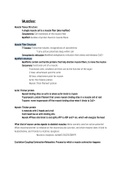
Muscles
Briefly goes through the structure of a muscle fiber and their functions. Neurons that carry signals to skeletal muscles, acetylcholine and nicotinic receptors. Excitation-coupling-contraction-relaxation process, motor units and motor unit recruitments. Twitch summation and tetanus. Concentric, eccentric, and isometric actions, muscle length to tension relationships. Creatine Phosphate system, anaerobic glycolysis, and oxidative metabolism. Atrophy, increased oxidative capacity, fiber type trans...
- Package deal
- Class notes
- • 6 pages •
Briefly goes through the structure of a muscle fiber and their functions. Neurons that carry signals to skeletal muscles, acetylcholine and nicotinic receptors. Excitation-coupling-contraction-relaxation process, motor units and motor unit recruitments. Twitch summation and tetanus. Concentric, eccentric, and isometric actions, muscle length to tension relationships. Creatine Phosphate system, anaerobic glycolysis, and oxidative metabolism. Atrophy, increased oxidative capacity, fiber type trans...
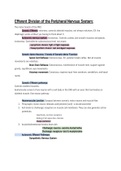
Efferent Division of the Peripheral Nervous System
Goes through the motor branches of the Peripheral Nervous System, the Somatic Efferent, and the Autonomic Nervous System. Sympathetic Division and parasympathetic divisions. Somatic Motor Neurons: spinal cord reflexes, brain stem reflexes, and voluntary movement. Cholinergic receptors and neurons, adrenergic neurons and receptors. The adrenal gland is very important! Agonists in drug testing, and antagonists in drug testing. Beta 1 and alpha 1 receptors
- Package deal
- Class notes
- • 5 pages •
Goes through the motor branches of the Peripheral Nervous System, the Somatic Efferent, and the Autonomic Nervous System. Sympathetic Division and parasympathetic divisions. Somatic Motor Neurons: spinal cord reflexes, brain stem reflexes, and voluntary movement. Cholinergic receptors and neurons, adrenergic neurons and receptors. The adrenal gland is very important! Agonists in drug testing, and antagonists in drug testing. Beta 1 and alpha 1 receptors
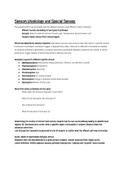
Sensory Physiology and Special Senses
Two different types of pathways of the Afferent Nervous System. The different types of receptors: mechanoreceptors, thermoreceptors, chemoreceptors, photoreceptors, osmoreceptors, baroreceptors, nociceptors. Where all of the type of stimuli are located and the duration of stimuli, the law of specific nerve energies (this is important!)
- Package deal
- Class notes
- • 4 pages •
Two different types of pathways of the Afferent Nervous System. The different types of receptors: mechanoreceptors, thermoreceptors, chemoreceptors, photoreceptors, osmoreceptors, baroreceptors, nociceptors. Where all of the type of stimuli are located and the duration of stimuli, the law of specific nerve energies (this is important!)
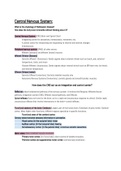
Central Nervous System
Goes through the central nervous system, peripheral nervous system, and how the afferent division and efferent division systems are different. The CNS act as the integration and control center, sensory cortex and motor areas of the brain, explains what the blood brain barrier is and the function, and why brian damage happens so quickly after the heart stops
- Package deal
- Class notes
- • 3 pages •
Goes through the central nervous system, peripheral nervous system, and how the afferent division and efferent division systems are different. The CNS act as the integration and control center, sensory cortex and motor areas of the brain, explains what the blood brain barrier is and the function, and why brian damage happens so quickly after the heart stops
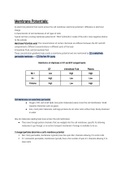
Membrane Potentials
Resting cell membrane potentials, sodium and potassium pumps, goes through hyperpolarization and depolarization of the cell
- Package deal
- Class notes
- • 2 pages •
Resting cell membrane potentials, sodium and potassium pumps, goes through hyperpolarization and depolarization of the cell
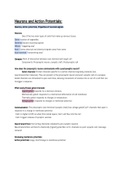
Neurons and Action Potentials
Goes through parts of an axon, what receives and what is delivered to other axons. Explains how neurons communicate with each other, through ligand-gated channels and voltage gated channels. How an action potential is generated, properties of neuronal signals, refractory and absolute refractory periods
- Package deal
- Class notes
- • 4 pages •
Goes through parts of an axon, what receives and what is delivered to other axons. Explains how neurons communicate with each other, through ligand-gated channels and voltage gated channels. How an action potential is generated, properties of neuronal signals, refractory and absolute refractory periods
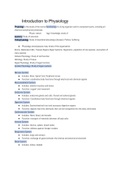
Introduction to Physiology
Describes the definition of Physiology, describes the systems involved within the human body, the themes of physiology, maintaining homeostasis, and positive and negative feedback loops.
- Package deal
- Class notes
- • 2 pages •
Describes the definition of Physiology, describes the systems involved within the human body, the themes of physiology, maintaining homeostasis, and positive and negative feedback loops.
